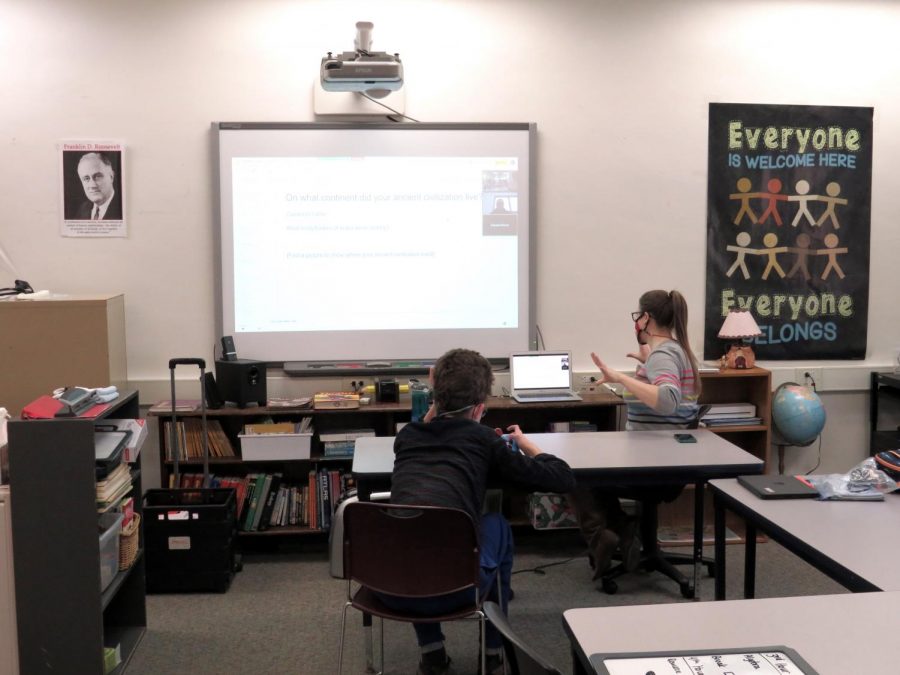SpecEd department remains mostly in-person
Mary DeMerit, special education teacher, works with Theo Berges, junior, on his schoolwork.
Among the students on campus engaged in “+” activities of the “Virtual+” curriculum are many students of Shorewood High School’s Special Education department. Multiple students report to school on the four days of synchronous classes to do their Zoom classes in school, and take some classes in person.
“[Students will] either use their chromebook, or we’ll connect a class to the smartboard, and we will –– you know just like any other student would virtually –– we’ll watch the class and go through discussions, and stuff like that,” said Mary DeMerit, Special Education teacher, “But we also are here to support the student with what they need during those classes. So that’s part of it, and then I also have my own classes, we have our Daily Living Skills class, our Vocational Skills class.”
Many students go into school on the four weekdays of synchronous classes. There are usually five to seven people between students and the two teachers.
“A lot of the students I have require one-on-one support for their academic needs, for communication needs, and that’s really difficult to provide that one-on-one support over a virtual platform,” DeMerit said, “They are able to come into school so that we can provide what they need for their classes.”
Maddy Hanrahan, freshman, has found being able to come into school helpful.
“Virtual learning has been going very fine because I get to see some of my friends and new teachers here,” Hanrahan said.
Leila Scardina, freshman, thought that the difficulties of this year were eased by having real time support from friends and teachers.
“At the beginning of it it was super duper hard but I had my friends and my teachers there to help me,” Scardina said. “I think the part that’s been decent about this is I get to see a couple of my friends.”
Both students were not expecting this for their freshman year, but have been able to make it through so far. Hanrahan and Scardina both participate in classes that take place on Zoom as well as a few in-person classes such as English, art and guided study.
This opportunity to be in school and the schedule with synchronous classes benefit the students and teachers.
“In the spring, the schedule was very flexible … that has been a huge difference, and I think a positive change in having a set schedule,” DeMerit said, “It just helps with keeping everybody on track and having the predictability, and also teachers having their classes live, I think has definitely helped with the learning.”
One big difference about being in school now –– besides the masks and extra safety precautions –– is how empty the school is.
“That’s kind of been the downside to this virtual learning is –– there’s still other teachers and students in the building, but you can feel the energy difference when it’s just a few people in the building versus a whole entire school,” DeMerit said.
Scardina has found this change to have an upside.
“I can walk down the hallways and have the entire hallway to myself,” Scardina said, “[Before] everybody, every single student had somewhere to be and they needed to be there ASAP and now I can walk slowly because I’m on a break.”
While the Special Education department is able to have students and teachers in school, they still are not able to do many things they usually do, such as going into the community or running the Doghouse, a stand in the school where students can buy snacks and treats.
“We would usually have community outings that we would go on to familiarize ourselves with being in the community, and working on those community living skills that we’ve kind of had to take a step back on just due to safety precautions,” DeMerit said.
Though no one’s plans for learning in the future are all solidified, the Special Education department plans to keep what is working.
“The plan is to continue what we’ve been doing since the start of the year, with having students come in face-to-face and adapting schedules as we need,” DeMerit said.

